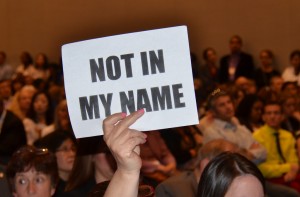 I cannot let pass without comment the momentous and unprecedented sequence of events that unfolded last night in the parliament of the United Kingdom. British Prime Minister, David Cameron, had – in response to the apparent use of chemical weapons against its own population by the Syrian government – recalled parliament early following the summer recess in order that it might debate and subsequently vote on a motion seeking approval in principal for a limited armed intervention.
I cannot let pass without comment the momentous and unprecedented sequence of events that unfolded last night in the parliament of the United Kingdom. British Prime Minister, David Cameron, had – in response to the apparent use of chemical weapons against its own population by the Syrian government – recalled parliament early following the summer recess in order that it might debate and subsequently vote on a motion seeking approval in principal for a limited armed intervention.
To the obvious surprise of all concerned the motion – on being put to the vote in the Commons – was decisively rejected. The UK will thus not be involved in any armed response to the events in Syria. The repercussions of this startling development (in the UK the Prime Minister pretty much has carte-blanche to go to war on his own initiative without consulting parliament) are awaited with interest.
One fact that is abundantly clear – sufficiently so that it now comes as a shock that it was not more widely anticipated – is that the outcome of the vote was heavily influenced by the events of a decade since that saw this country committed to an ill-starred invasion of Iraq based on what turned out to be faulty intelligence. The deeply flawed nature of that process – not to mention the hideous and tragic consequences of the entire enterprise – has left a sufficiently vivid scar on the psyche of the nation that even our normally bellicose parliamentary representatives shied away from a repeat experience.
During the debate it became clear that following questions would have to be answered satisfactorily before any agreement could be reached:
- Had chemical weapons actually been used? The evidence – though circumstantial – suggests that they had, though the UN Inspectors’ report – and thus a definitive answer – has yet to be delivered.
- If they have indeed been used, was the Syrian government the culprit? Cameron admitted that it was not possible to state categorically that this was the case, but stated that – in his judgement – the weight of the (circumstantial) evidence pointed to its complicity.
- Assuming that a clear evidence trail could be established what would then be the exact aim of any armed intervention? Any action would need to be clearly defined in terms of intent and extent, and would be required to improve demonstrably the situation in Syria.
- What would be the exit strategy from any action taken? How would the international community prevent any action escalating into something even more tragic than the current situation.
Parliament clearly felt that these questions had not been adequately answered and thus withheld their consent. Given my views on violence you will not be surprised to hear that Parliament – in this case – gains my approbation.
To those who would argue:
- that we should take action to prevent the Syrian government from further use of these weapons – I would point out that no action has yet been proposed that would actually have this effect. Indeed, there is no armed response – other than invasion – that could be guaranteed so to do.
- that not to take action would be to send a signal to Assad that he can get away with such crimes against innocent civilians – I would say that we are not dealing here with a child that is testing the limits of acceptable behaviour. History – recent history – informs us that a dictator who is prepared to use such weapons against his own population will not be persuaded to stop so doing by the ingress of a few cruise missiles. It is possible to effect such an aim – as the allies did in the case of Saddam Hussein – by invasion… but look at the consequences of that course of action.
- that we should send a clear signal to the Syrian government – I would point out that a signal is only clear if the consequences of ignoring it are made evident – and if there is the credible will to enforce such consequences. Vague threats do not a clear signal make.
- that we have a moral obligation to intervene – I would ask how it is that of the many atrocities that have been perpetrated across the globe in recent decades by other dictators and other regimes we have an ‘obligation’ in this case, though apparently not in others? If it is an obligation then it must apply in all cases – and not just those that suit. If the obligation is in fact relative then the moral case is surely dubious at best.
- that not to take action would be cowardly – I would suggest that actually the opposite is true. To admit that there is no clear course of action that can be taken that would improve the situation actually requires more courage than the inverse.
- that not to take action would leave us ‘sitting on the sidelines wringing our hands’ whilst leaving the US and others take on the role of global policeman – I don’t know where to start with this one!
The suffering that we are seeing in Syria is truly shocking and terrible. The acts that are being perpetrated – as far as one can tell by both sides – are criminal and those responsible must eventually be prosecuted through the international courts. We must – however – be rigorous in the analysis of our motives for any proposed response. If our desire to pursue a course of armed retaliation is rooted in the pained belief that ‘we must do something‘, then the danger is that our true motivation is the assuaging of our own feelings of guilt and helplessness, rather than any realistic ambition to produce the most beneficial effect on the ground… which latter might in this case simply mean just doing the least possible harm!
It is a truism to state that there are no easy answers. I state it nonetheless… The one positive that I can myself draw from this perilous affair is that maybe – just maybe – we might be starting to learn some lessons from our history.
Tags: Politics, United Kingdom
-
Thank you Andy for setting this all out so clearly. I agree with your statements but found it hard to get these viewpoints from reading the usual newspaper articles.
-
Once again you’ve managed to express the ‘this clearly isn’t right, but that doesn’t make this right’ and ‘how can they stop this problem without causing a million more’ and ‘sometimes doing nothing might be better than doing anything’ thoughts going round in my head much better than I was able to do.
The use of chemical weapons does, for some reason, feel worse than many of the other atrocities man insists on visiting on fellow man. It is such an inhumanly hands-off way to attack a defenceless populace and it speaks of the gassing of Jews in Auschwitz or dropping of napalm on Vietnamese villagers. It is inexcusable. But that doesn’t make a half-assed Western intervention a solution to the problem.
Not in my name either.
Comments are now closed.


3 comments